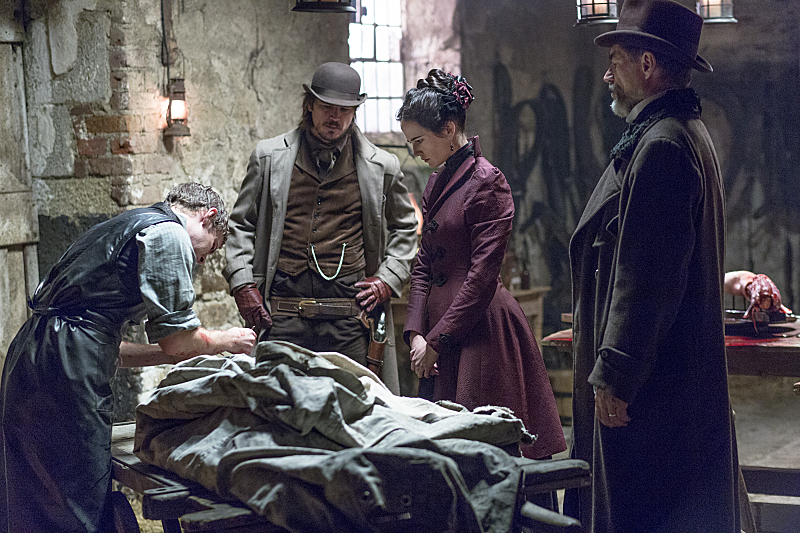
Once upon a time, horror was a genre you could do on TV only in anthology shows like Night Gallery, movie creature-features, or local nightly newscasts. Today shows like The Walking Dead, American Horror Story, and Sleepy Hollow, which have managed to sustain both terror and ratings, have opened the casket doors for successors. (Even True Detective, cop drama though it was, had a little Lovecraft in it.) Sunday night, the premieres of Rosemary’s Baby and Penny Dreadful showcase two different approaches to the format: broadcast and cable; miniseries and regular series; not-crazy-enough and so-crazy-it-kind-of-works.
NBC’s Rosemary’s Baby, adapting Roman Polanski’s adaptation of Ira Levin’s novel, is the more reserved of the two shows (if you can say that about the story of a plot to conceive a devil-baby), mostly to its detriment. The two-night series (airing Sunday and, strangely, Thursday) moves the story from New York to Paris, but keeps its essential shape and plot: young couple Rosemary (Zoe Saldana) and Guy (Patrick J. Adams) are struggling to have a baby, launch his literary career, and find a place to live in an expensive city. They find help from seemingly kindly older benefactors the Castavets, Roman (Jason Isaacs) and Margaux (Carole Bouquet)–but the assistance comes with a cost, in the form of their creepily intense interest in the future of the baby-to-be.
This Rosemary is directed by Agnieszka Holland, who has shot lively and complex episodes of The Wire and Treme, but the miniseries is leaden and slack. Part of the problem maybe simply be bloat; even if NBC adds only a half-hour or so to the movie’s run time, you feel every minute here, and it may be tough to get viewers to return four days later for part two. But the greater problem is Rosemary and Guy, who are as anesthetically generic as a couple in a credit-card commercial. There’s little connection between Saldana and Adams; you should get the sense of a complex relationship whose ordinary stresses turn hellish, but instead, this Rosemary’s Baby is like a lifestyle show that gradually turns into a slasher movie. (There are enough art-directed images of cooking, for instance, that it feels like a second-class spinoff of Hannibal.) There are redeeming notes, especially Isaacs’ refined malice, and toward the end the miniseries embraces its Satanic lunacy and picks up momentum. But this remake is finally too dull to give the devil his due.
Showtime’s Penny Dreadful, on the other hand, would rather be damned than boring. I hesitate to get bogged down in the supernatural premise–you can see the first episode online now if you’re curious–but in a nutshell, it’s: Victorian London goes to hell, or at least the nether-space between hell and the world of the living. Timothy Dalton and Eva Green star as Sir Malcolm Murray and Vanessa Ives, two spiritualists on a quest that requires regular encounters with the damned. (They’re like Mulder and Scully, but both, rightly, believe.) After recruiting as muscle Ethan Chandler (Josh Hartnett), an American shootist unaccustomed to gunning down vampires, they’re off on a paranormal investigation that takes them through drawing rooms and the demimonde. (The show loves words like “demimonde,” caressing them like baubles in an antique store.) And the journey brings them across the paths of literary characters including Victor Frankenstein (Harry Treadaway) and Dorian Gray (Reeve Carney).
Penny Dreadful is, in a good way, reminiscent of a genre-bending graphic novel. (Its title comes from the luridly illustrated, sensationalist paperbacks that Victorians devoured.) In a way its historical-supernatural mishmash resembles the steampunk spirit of NBC’s Dracula, but without that show’s distracting high-mindedness. (“You know what would make this ancient vampire lord more interesting? Alternative energy!”) It plays its outlandish premise entirely straight, and it all the more entertaining for it.
And yet there’s historical grounding in its far-fetched story; it re-creates, if not the actual Victorian era, the sensibility of a period in which people felt like they were on the cusp of great change, unsure if that change would look like science or magic. (As a sidebar, the show makes me even more excited for the coming BBC adaptation of the similarly themed Jonathan Strange and Mr Norrell.) Green in particular is captivating, equally able to still you with a composed stare or sell an absurdly over-the-top demonic-possession sequence that will put you on your fainting couch.
Is Penny Dreadful a great drama? After two episodes I doubt it, and I’m guessing its strength comes from not trying to be one, but instead owning its gilded, operatic ridiculousness. Rosemary’s Baby feels overgestated; Penny Dreadful is simply over the top, but that’s probably the right place for it to be.
More Must-Reads from TIME
- Inside Elon Musk’s War on Washington
- Meet the 2025 Women of the Year
- The Harsh Truth About Disability Inclusion
- Why Do More Young Adults Have Cancer?
- Colman Domingo Leads With Radical Love
- How to Get Better at Doing Things Alone
- Cecily Strong on Goober the Clown
- Column: The Rise of America’s Broligarchy
Contact us at letters@time.com